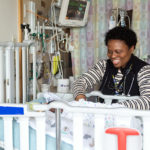Nurses Week 2022: Leading an enterprise-wide response to COVID-19

The Infection Prevention Control (IPC) team at Boston Children’s Hospital plays an important role in the management of all infectious disease events. Its focus is to maintain a safe environment for patients, families, and staff. Prior to the COVID-19 pandemic, the IPC department responded to a novel influenza pandemic and prepared extensively for patients with the Ebola virus, who fortunately never arrived. That experience was pivotal in the IPC’s ability to meet the demands of COVID-19. However, despite this past experience, COVID-19 presented new and significant challenges for the IPC team and the organization.
The global COVID-19 pandemic in March 2020 required a true system-wide response. IPC met with Emergency Management, epidemiologists, and medical directors on a regular basis as part of the Hospital Incident Command System (HICS). HICS helps health-care organizations improve emergency management planning. IPC leadership was instrumental in policy creation and decision-making. Throughout this crisis, everyone worked together and leaders emerged to take on new challenges.
Emerging leadership
Paula Conrad, MSN, RN, CNL, CIC, a Level II infection preventionist, gained clinical expertise and a growing commitment to the field of infection prevention when she served for several years as the unit-based infection control nurse for the Medical Intensive Care Unit (MICU) at Boston Children’s. She transitioned to the IPC department in 2019 and emerged as a strong leader and key contributor during the height of the COVID-19 pandemic.
Infections prevented often translate directly into quality improvement and lives saved.”
Conrad drew upon her experiences as the clinical coordinator in the MICU to evolve and meet the new leadership challenges. “I have really grown in my ability to be flexible and change course quickly to meet competing demands,” she says.
Creating solutions
The IPC team staffed the hospital’s Command Center, working from 7 a.m. to 7 p.m., and responded to urgent information needs and requests for assistance as they arose. In all, 1,169 COVID-19 issues were logged and addressed through the HICS structure from 2021 to 2022. At certain points, the IPC pager volume was so high that the team needed to rotate coverage every 12 hours. As a result, IPC created a buddy system pairing infection preventionists to share pager responsibilities. When Conrad’s partner was a new staff member, she became a peer mentor and coach, serving as a source of support and knowledge.
A natural problem solver, Conrad wanted to improve departmental workflow and reduce the strains felt within the IPC’s small team of infection prevention specialists. She spent time reviewing the many processes in place to identify redundancies or inefficiencies. Next, Conrad brought solutions to the team and together they discussed ideas and developed new solutions.
For example, Conrad successfully streamlined how IPC managed COVID-19 order entry and results. Then she trained a team to handle that process so the rest of the IPC could focus on other COVID-related and infection control responsibilities. Conrad also co-led weekly calls for COVID-19 information specialists from various hospital departments to keep them updated on policies and procedures, and to answer any questions. Even as the pandemic recedes, IPC continues to provide a high level of support across the enterprise.
Professional advancement
At Boston Children’s Hospital, there is an established nursing professional advancement model (Level I, II and III), which provides direct-care registered nurses the opportunity to expand their skills and receive additional compensation following a formal review process. Conrad took advantage of the nursing clinical ladder program and advanced to staff nurse Level III. However, there was not an established clinical ladder for infection preventionists who are prepared not only as registered nurses but in a wide range of fields. Jennifer Ormsby, DNP, PNP, CPN, CIC, IPC director, truly values professional advancement and wanted to provide a similar opportunity akin to the nursing advancement model for infection preventionists.
In 2020, Dr. Ormsby, Conrad and Celeste Chandonnet, MSN, RN, CCRN-K, CIC, infection preventionist II, collaborated to develop the infection preventionist clinical ladder. They used the Association for Professionals in Infection Prevention (APIC) competency model and the Boston Children’s nursing clinical ladder as frameworks. They created both a policy and related job descriptions, as well as a competency grid describing the criteria to advance from IP Level I to II to III. Conrad has since obtained her infection control certification and advanced to IP Level II.
Hopes for the future
“Infection Prevention and Control is a unique specialty and provides incredible opportunities for quality improvement and research,” says Conrad. “Our department is involved in so many exciting projects, both within the hospital and in collaboration with other institutions. I hope to contribute to this work, and to the profession at large, in a meaningful way — knowing that infections prevented often translate directly into quality improvement and lives saved.”
Related Posts :
-

My nursing story: Brittany Frazer
Brittany Frazer, RN, CPNP, CPHON, is an advanced practice registered nurse level I at Dana-Farber/Boston Children's Cancer and Blood ...
-

All in the family: Dynamic nursing duos in the Heart Center
Sometimes nursing runs in the family, and at the Boston Children’s Hospital Heart Center, we’re lucky to have ...
-

Boston Children's nurses: Setting the standard for innovation
As clinicians at Boston Children’s Hospital continue to pioneer new therapies for both kids and adults, nurses play a ...
-

Nurses Week 2021: Integrating new therapies into nursing practice and patient care delivery
A revolution in pharmacological gene therapy is underway, as indicated by a significant acceleration in the creation of new therapies ...





